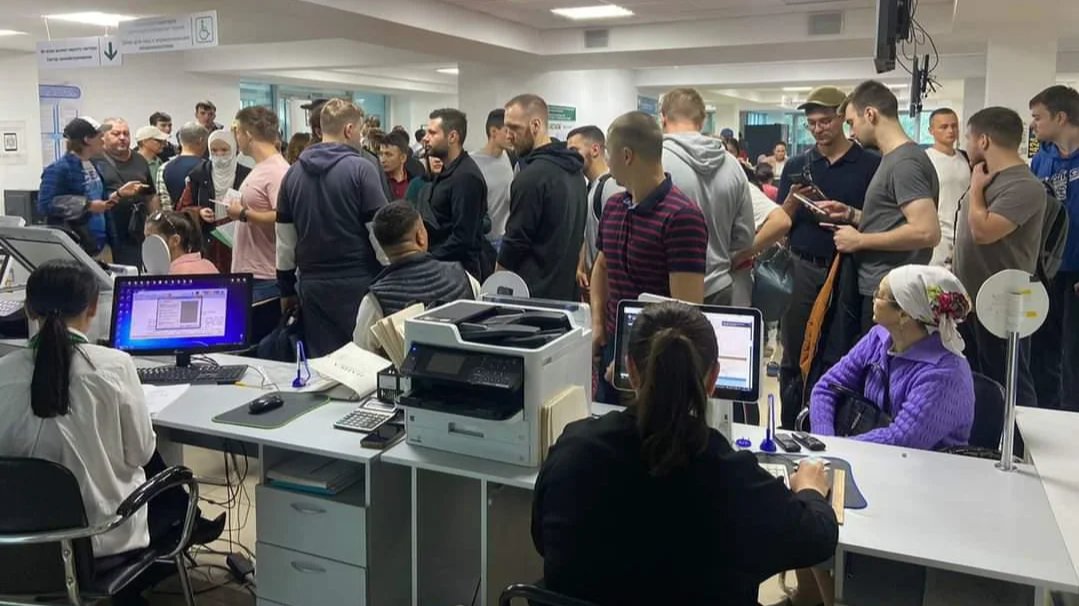Male Russians started leaving their country in large crowds after Vladimir Putin had announced “partial mobilisation” on 21 September, aware that they might be sent into the battlezone should they stay. One of the most popular destinations is Kazakhstan: it has a multitude of checkpoints along the 7,500 km border with Russia, and it is also visa-free. It soon became apparent, though, that the border-straddling Kazakh cities were having issues with the extremely dense flow of Russians. The situation in Oral, a city in western Kazakhstan just 300 km from Russia's Samara, is more critical than in other border cities. Oral also has road links with the Russian cities of Saratov and Orenburg, so the number of Russians arriving here is so big that some of them are forced to sleep outside (the city is experiencing a cold snap in recent days). Lukpan Akhmedyarov, a local journalist, has spoken to some of the newcomers for us.
They arrived as a summer's heavy rain: at first, single drops started falling, and in a minute's time it was raining buckets. The word “mobilisation” became the most mentioned one in the streets of Kazakhstan's Oral just a few hours after Putin's address to the nation. The cause was obvious: the newly arrived groups of 4 or 5 young Russian men with backpacks and trolley bags literally everywhere. There were few of them several hours after Putin's address, but hundreds arrived in the morning, and thousands of Russians were roaming the city by noon.
22 September
My 16-year-old daughter has a summer job as a waitress in a food spot here in Oral. The day after Vladimir Putin had announced mobilisation, she received a phone call from her manager who asked her to turn up to work as soon as possible.
“Why so urgent? Is someone ill and couldn’t come into work?” my daughter asked.
“No, it's just that there are so many Russians here since morning. The place is packed, and we need more waiters,” the manager explained.
As we arrived, we saw that there was not a single table available, which is a common thing to happen in a round-the-clock food spot. The unusual thing was that the place was packed with guys only, and all of them were Russians. Most of them had trimmed beards and wore glasses, many wore shorts, too. It was exceptionally quiet down there; the men were scrolling their phones and looked troubled. There were all sorts of backpacks, coffers, and bags next to each table; and only two waiters were running around in haste.
“Bloody hell!” my daughter said and rushed to the changing room.
Another huge crowd of young Russian lads gathered near a phone company's office just across the street, although it was an early hour: 9 and something in the morning. Same as the guys at the food spot, they looked concerned and couldn't stop scrolling through their phones.
I approached a group of three lads, one of them looked like a teenager. It turned out he was actually 28 years old and came here from the Moscow region.
“Hey there! Are you from Russia? You guys are here to buy a local SIM-card, right?” I asked them.
“Yes,” replied one of the guys. He was tall, had curly hair, and wore shorts and a yellow coat. It appeared that he answered both of my questions with just one word.
“Do you know that after you get a customer phone number you need to register it with the local authorities?” I asked them.
“Could you help us with that?” they replied, perking up.
I started explaining how the registration was done, and when I finished my speech, there was a crowd of 15 or 20 men around me, all listening closely.
After I spoke to them for a quarter of an hour, I learned that most of them spent hours at the Russia-Kazakhstan border and arrived in Oral this morning. The first thing all newcomers try to do here is buy a SIM-card with mobile data.
“I need to give my mum a call. The only thing she knows is that I headed for the border checkpoint yesterday,” a guy wearing a Darth Vader T-shirt told me. He looked no older than 20 years.
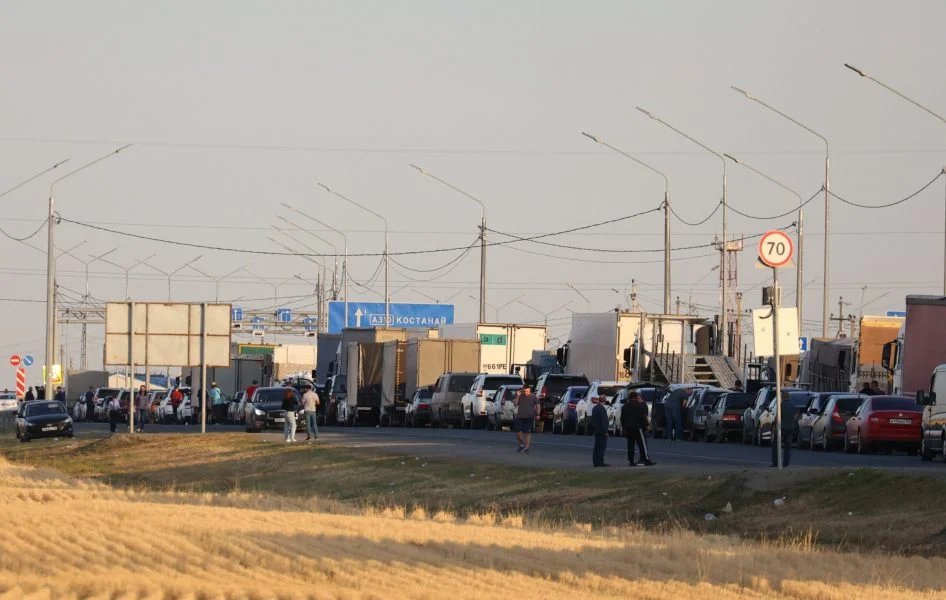
A line of cars on the Russia-Kazakhstan border. Photo: m.zerkalo.az
In a few minutes, I could hear him talking on the phone: “Mum, I'm okay... Mum, it's alright... Mum, stop it, please. I'm telling you, I'm fine. No, I haven't told anyone at work yet.”
The conversation was short. The guy asked me to wait for a couple more minutes, and then called some girl.
“There are so many guys like me here. Everyone is swarming into Kazakhstan now... No, I haven't searched for an apartment yet. I had no Internet connection, so I asked a local to share some Internet with me. Crossing the border was hell, I don't think I could do it again. Listen, I know.”
“What's the situation at the border?” I asked him when he hung up. “You said it was hell there.”
“It's as bad as can be. There's a line of cars 5 or 6 km long. The taxi driver dropped me off at the top of the line, and I had to walk to the checkpoint for over an hour. The Russian frontier guards are to blame, they only let about five cars through each hour. If you go by foot, you might save some time as you have no car to be checked. Kazakhstan’s border guards work way smoother, they let people in swiftly. My sister wanted me to go to Astana by plane, but there were no tickets available.”
“Do you know anyone in Astana?”
“No. It's my first time here in Kazakhstan, I learned about Oral’s existence yesterday.”
“Are you fleeing mobilisation?”
“Of course, I am! Who do you think I am, a tourist? I turned up at work in the morning, an hour before Putin's address was aired. My sis called me and said I should leave the country. I spent the whole day at the office, and all our workers there are women. We talked about mobilisation all day long. I called off from work after lunch, came home, grabbed my stuff, and left for the airport. My sister could only find a ticket to Samara.”
“What do you think of this war?”
“I think that Putin is an asshole. We could be living a normal life if it weren’t for Putin.”
“Were you against the war on 24 February, too?” I asked him.
“How can one not be against the war, you tell me?!”
“Well, you know, judging by TV, most Russians sort of supported the war.”
“Fine then, keep on watching your bloody TV!” It appeared to me that he was getting more and more unfriendly.
“No, no, wait, it's just how Russians are portrayed on TV!”
“Nobody supports the war in Russia! And nobody supports this bald-headed moron, too. Don't believe what they tell you on TV. Most Russians understand what's going on, and they are against the war.”
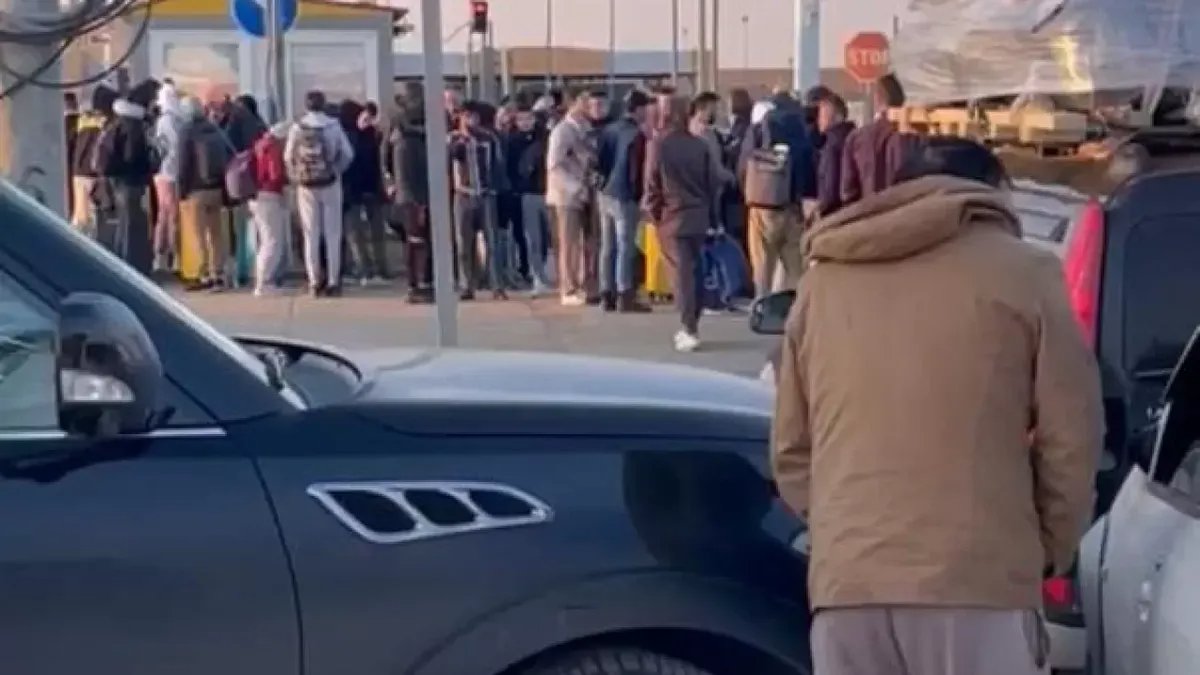
The queue at the Russia-Kazakhstan border Photo: social media
***
A journalist for TV Rain, Russia's independent TV channel in exile, called me an hour later. He asked me to meet his younger brother who was coming to Oral from Samara. I promised that I would find an apartment for him, but it turned out that finding an apartment for rent was now impossible in Oral.
“You can't be serious,” a friend of mine that dabbles in the local real estate business told me. “Not a single bed is available in Oral, every shithole here has tenants now. There's no way a family can get a separate apartment. We assign each apartment to two or three families now.”
The demand for short-term rent skyrocketed in less than a day in Oral, causing an enormous price surge. Apartments worthy of 10 or 12 thousand KZT (€22-26) per day now cost about 25 thousand (€55). Moreover, even with this price surge, there were no apartments available by the end of 22 September.
23 September
The crowds before the telephone companies' offices grow larger. There are now hundreds, not dozens of Russians queuing up for SIM-cards early in the morning, and there are also long queues at the local Citizens Service Centres, i.e., community service offices.
“These Russians only bring trouble!” a woman 50 or so years of age yells at the manager.
“They are not fleeing any war! Nobody attacked them, and nobody killed their own kind. They just want to dodge the draft! Why are we, locals, suffering because of them?! I've been here for more than an hour, that's nonsense!”
What she says is true, there are indeed crowds of Russians in the centre. In fact, the only Kazakhs here are the clerks, me, and the angry woman. And about a hundred Russian men. They turn their heads at her and quickly look away when she makes eye contact with them. None of the Russians dare argue with her.
One of the clerks asks her in the Kazakh language to calm down and stay patient. I ask Russians at the reception where the end of the queue is. They shrug their shoulders.
“Actually, this woman came here last. I was at the end of the queue before she came,” one of the guys says, pointing at the screaming woman.
Visiting the community service office cannot be avoided as it is the only place where one can receive an ID number that is necessary to open a bank account. Lev Leshchenko, a Russian singer, visited Kazakhstan in May months before the mobilisation was announced, and was spotted at one of the offices; he was most likely willing to open a bank account of his own, too. Most such offices in cities along the Russian border are having a crazy time now. One of the clerks in Oral told me that the number of ID applications had increased fivefold when the Russians started coming.
“It's our most popular service at the moment. There's nothing else Russians are interested in; and there are far more of them than the locals at our office these days,” she says.
* * *
After leaving the office, I ask my colleague from TV Rain whether his brother made it to the Kazakhstan border. It turns out that he only flew into Samara, and was now going to the border by taxi.
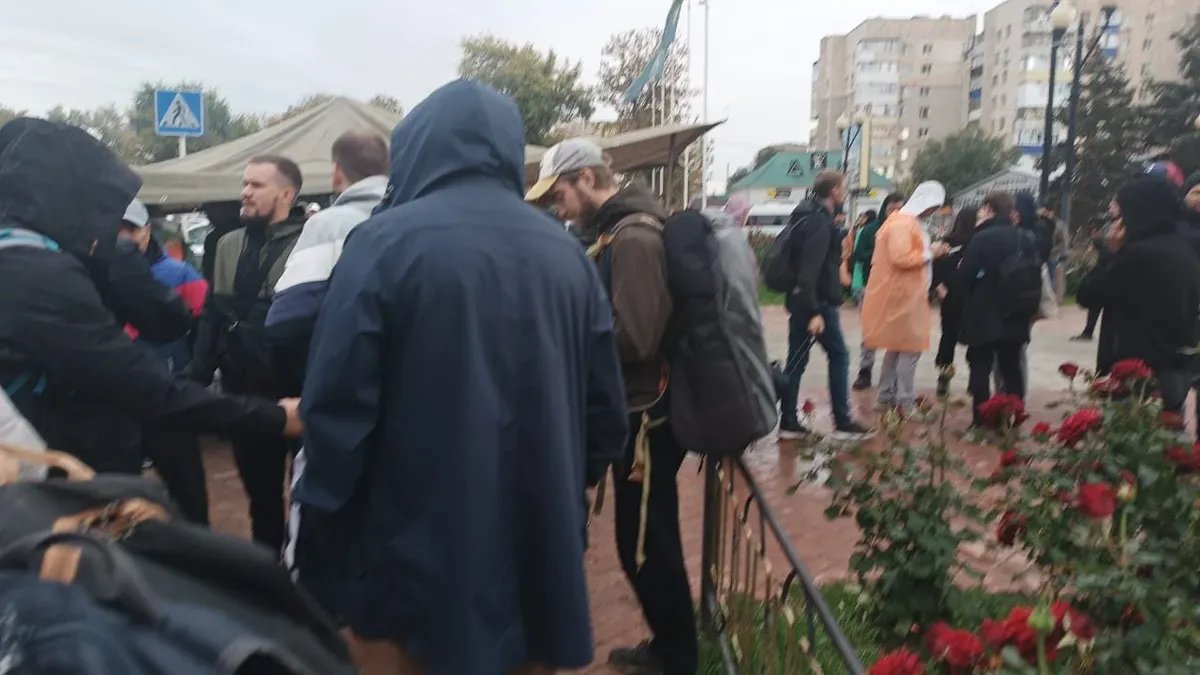
Russians in Oral. Photo by Lukpan Akhmedyarov for Novaya Gazeta. Europe
***
Two men and a woman, all about 30, stand on the street near the supermarket. Judging by the suitcase and backpacks, the couple is not local. They are very loudly and emotionally reprimanding the second man. When I pass by, the young woman loudly says: “Go to hell with this kind of help! Thanks! We don’t need it!”
Her companion tries to calm her down. I ask what happened. Turns out that the young couple arrived in the city half an hour ago after having crossed the border. Their interlocutor (he has already left) is a local resident that offered to help them find a place to rent.
“And what’s the issue?” I ask.
“This asshole said that Putin would win in Ukraine soon, and then we’d be able to go back home. Fuck, we are trying to save ourselves from Putin, while you apparently have your own fools here.”
The young woman suddenly stops talking, looks at me, and asks after a small pause: “Are you pro-Putin too?”
I show her my hand so she can see my blue-yellow beaded bracelet with Ukraine written on it.
For a couple of seconds she studies the bracelet, then shakes my hand, and introduces herself: “My name is Yulia! Glory to Ukraine!”
Afterwards, I spend half an hour driving Yulia and Stepan around the city. The spouses ask me whether [Kazakhstan’s President Kassym-Jomart] Tokayev is to be trusted — he has not recognised the Luhansk and Donetsk “people’s republics”. What really happened in Kazakhstan in January? Is it possible for the Kazakh side to extradite them on Russia’s request?
* * *
Four hours later, I contacted the TV Rain journalist again. I asked whether his brother had crossed the border. Turned out that he had reached the border and was now going to the checkpoint by foot along the multi-kilometre car queue.
24 September
Vanya, the brother of the TV Rain journalist, called me at 7AM and said that he had just crossed the border and was standing on the Kazakh territory. An hour later, I met him in Oral near a house in which there was unexpectedly an apartment for rent available. Although, another Russian journalist Anya was supposed to move to the same apartment as Vanya: she and her husband were supposed to arrive in Oral earlier, but something had delayed them. Vanya’s trip from Moscow to Oral took about a day. He spent five hours crossing the border.
“My Samara taxi driver dropped me off at the end of the car queue towards the border checkpoint.
He said he wouldn’t be able to go any further. I went on foot. It turned out that the car queue stretched for about 10 kilometres. For almost the entire distance, I walked with my suitcase and backpack.”
“Why almost?” I asked.
“Two kilometres before the checkpoint, there were taxis in the car line, they were offering to help cross the border in an accelerated mode.”
“And how much does their service cost?”
“Five thousand rubles (€90).”
“Damn!”
“At first, they asked for 10,000 rubles (€180).”
An hour later, Anya’s husband Andrey arrived. They drove from Moscow in their own car; while they were standing in the multi-kilometre queue towards the border checkpoint, came the news that the Russian government could close the border for men subject to mobilisation.
“I went on foot, so I could cross the border faster. Anya stayed in the queue with the car. I think she’ll be here by evening.”
I was writing down this report on the evening of September 25. At that point, Anya was still in the border queue. She had spent more than two days in the car by then.
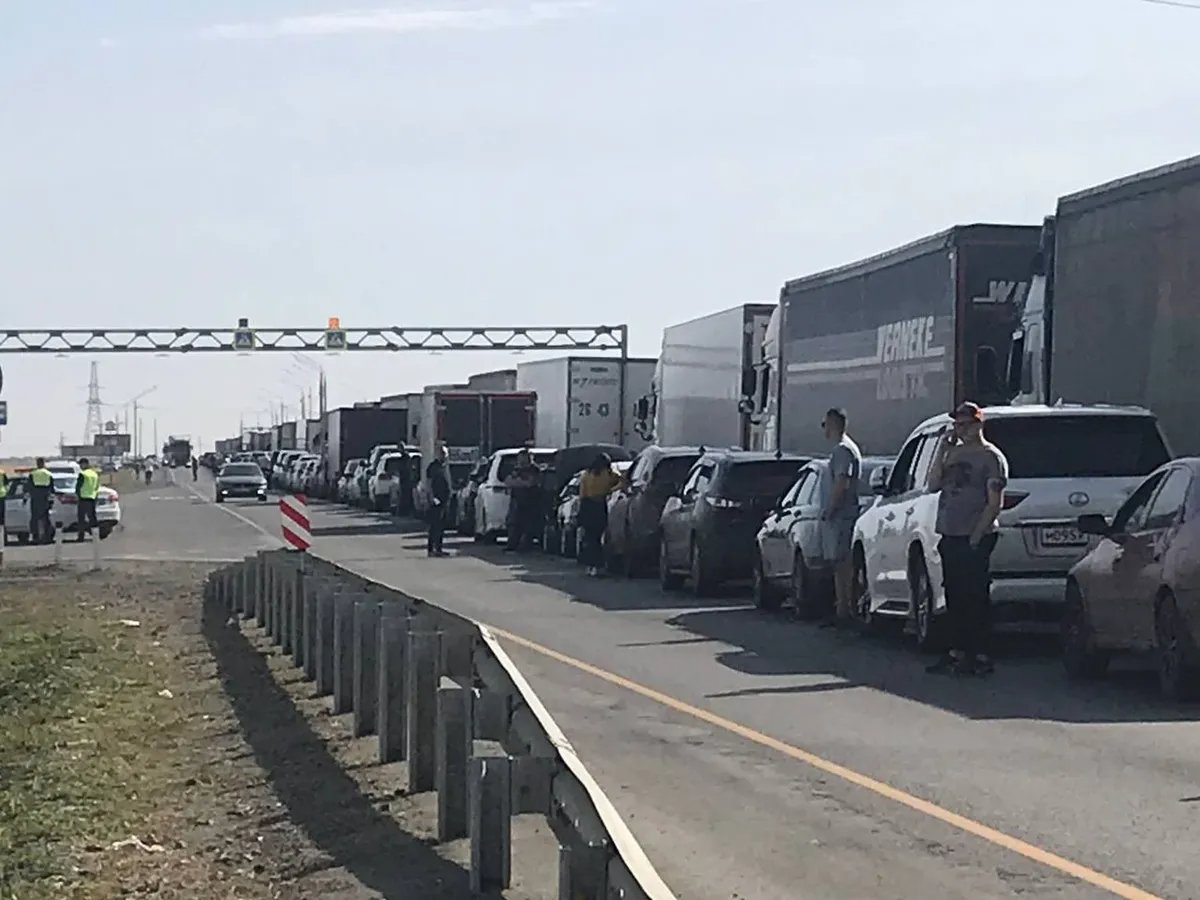
The queue on the border. Photo: social media
***
After lunch, I suggested Andrey and Ivan go to a Russian migrants meeting. The meeting was organised by more experienced Russian migrants — those who migrated from Russia to Oral after the start of the invasion of Ukraine. The “oldies” decided to share their experience with the “newbies” — those that arrived in Oral in the last two days. Around a dozen young men-”newbies”, aged from 20 to 25, came to the meeting. There were three “oldies”, they were much older.
A tall and large man, who introduced himself as Dmitry, talks about moving to Kazakhstan from Russia a few months ago; he opened a business here.
“As I understand, you all came to Kazakhstan because of the same reason. So let’s agree at once — I do not give consultations on how to evade mobilisation,” Dmitry says loudly.
“I’m not here because of the mobilisation, actually. I came to visit my sister,” a young dark-skinned man replies.
“And how many of you came to visit your sisters?” Dmitry asks the gathered men.
“We all are here to visit his sister!” someone jokes.
For about an hour, the more experienced Russians explained to the “newbies” how to receive an ID number, the card of which Kazakh bank it is better to open, how to transfer money from a Russian card to a local one, how to find a job, rent an apartment, etc.
Later in the day, a message appeared on the local Telegram channel Relocation Oral: a local gas station chain was offering free food rations and bottles of water to all Russians. To receive the aid, one just needed to show their Russian ID at a gas station.
By evening, the weather had gotten worse. Small groups of Russian men with backpacks and suitcases have become so frequent that the locals have become a minority in the streets. In the meantime, taxi drivers kept dropping off more and more people fleeing the Russian mobilisation from the border. Many food spots and cafeterias have started operating 24/7 to be able to feed the newcomers. There were no longer apartments for rent, for any money.
In the evening, the administration of the biggest cinema in the city cancelled all showings and posted a message on social media inviting people to stay overnight. Men with suitcases and backpacks filled up all six movie rooms and the lobby.
A volunteer team organised a support group for Russians. A tent was put up near the railway station, so Russians, who had just arrived in the city, could get free tea and hot meals there.
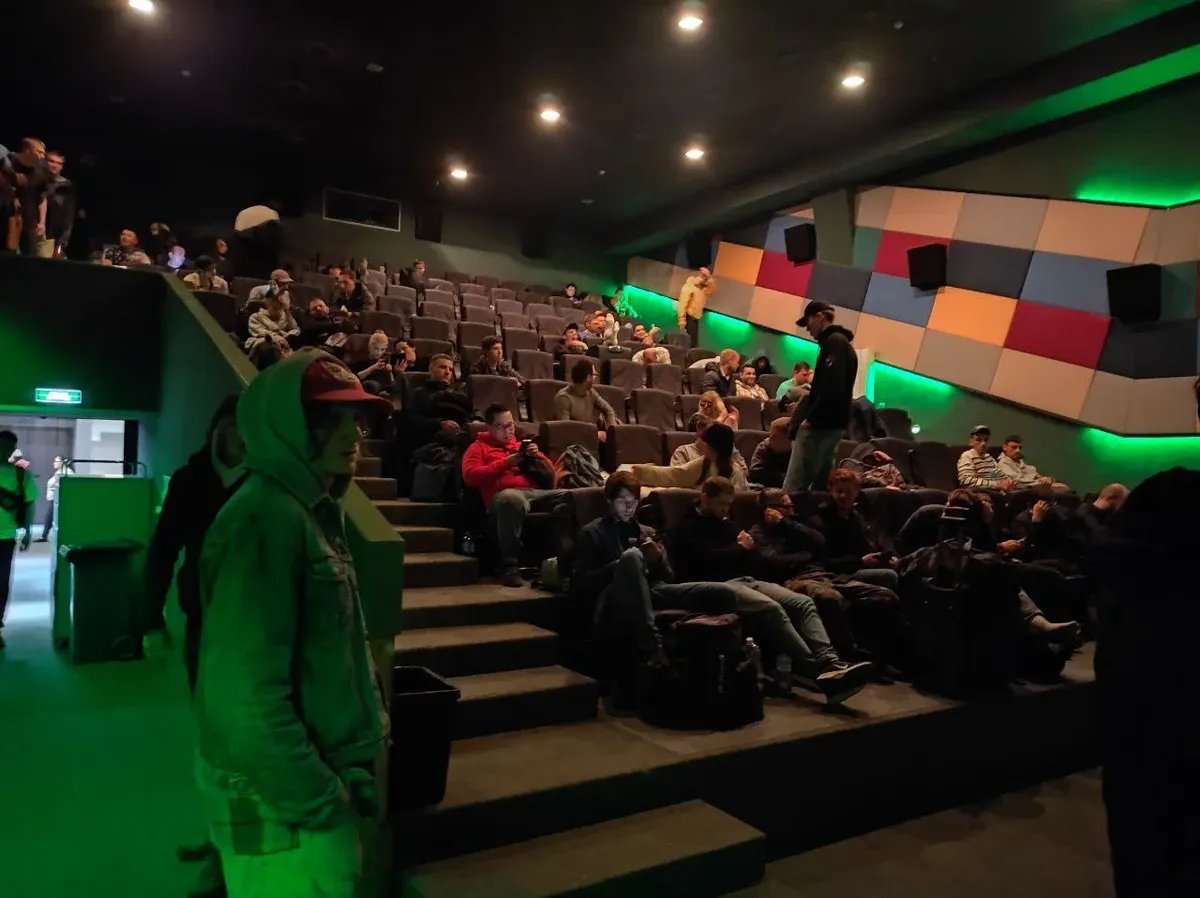
The cinema that offers help to Russians. Photo: Telegram channel Relocation Oral
At the same time, more and more posts started getting published on social media, the authors of which were expressing their disagreement with this “hospitality”.
“Explain this to me: back in spring, when we were collecting aid for Ukrainians, many local Russians were against it. Now, everyone is suddenly so kind. Why such different approaches to charity? Because we don’t ‘abandon our own’, right?” is the typical, although not the rudest, example of such posts.
Several groups of activists from different cities of Western Kazakhstan recorded a video message with an appeal to the government to close the Russian border. Their main argument was that the big flow of Russian migrants could become a national security threat in the future.
On the same day, videos from the Russian border settlement Elton appeared on the web. The footage showed the local men being sent to the war in Ukraine. The majority of the men that live in Elton are ethnic Kazakhs.
“Why won’t our government do anything to bring Russian Kazakhs to Kazakhstan, while thousands of Russians are freely entering our country?”, “Russians, no one wants you here. Go back to your country and overthrow Putin!” — these are some of the social media comments from these days.
25 September
The railway station square, which is usually quite full, currently resembles a marketplace. Around a dozen Russians are standing in a queue in front of a big tent. They are being handed pilaf on plastic plates, tea in paper cups, and local SIM-cards. Volunteers in orange vests loudly call out: “Hot meals! Hot tea! SIM-cards! For free!”
A young woman in the volunteer vest tells her friend: “They’re so weird — they recoil from you when you tell them it’s free.”
Three guys with suitcases and backpacks approach the tent. They shyly ask if the food is actually free.
“Yes, yes! Free! Take it!,” the young woman calls them inside the tent.
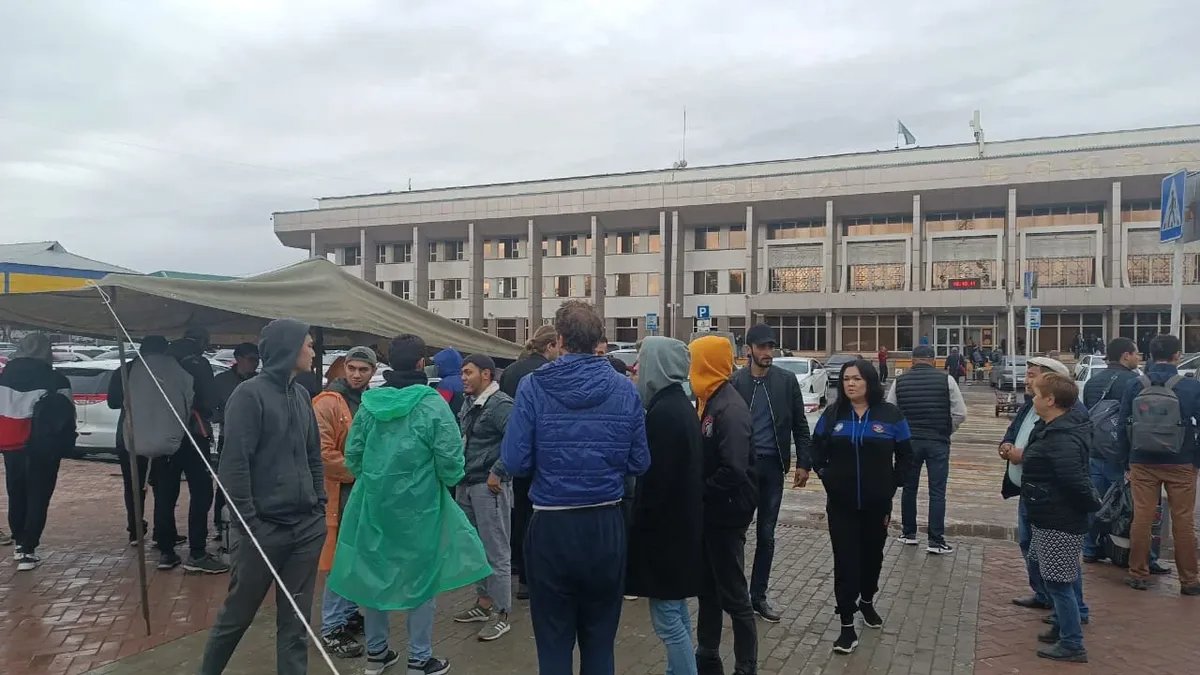
Russians at the rail station square in Oral. Photo by Lukpan Akhmedyarov for Novaya Gazeta. Europe
Around ten local young women and men stand near the tent. They all offer help to Russian guys — to host them for a night, to take them to a bathhouse, to feed them. The guys from Russia listen to their offers with suspicion and shrug — like, give us some time to think.
Near the tent, I meet four young men. They ask me where they can buy a local SIM-card and exchange money. I show them the way to the closest exchange. The guys try to create a route on their smartphones, but it turns out that their Russian SIM-cards do not work abroad. I offer to give them access to Wi-Fi using my phone.
“How much will it cost us?” one of them asks.
“Nothing! I’ll do it for free,” I tell them.
After examining me from head to foot with suspicion, the guys finally agree to use my Wi-FI. Everyone at once starts calling their relatives and close ones. After the calls, I offer to drive them to the closest exchange.
“How much will we owe you?”
“Nothing. It’s on my way, and it’s not far,” I answer.
The guys get in my car. At first, they stay quiet while I drive. Then, one of them asks: “Why is everyone helping us for free?”
“Wouldn’t you do the same?” I ask, looking at my interlocutor through a mirror. The mirror reflects a thin and pale face. Grey eyes study me nervously. The guy looks about 17-18. He sits in the centre, with his friends caging him in on both sides. He holds his backpack tightly.
After a small pause, he replies: “I would, of course. But it’s all very strange.”
“What’s strange about it?”
“No one helps anyone in Russia,” his friend from the front seat replies.
“Well, it’s not like no one helps. It’s just that people there are cold. And here, the people are warm.”
* * *
After returning home in the evening, I called Andrey to find out if there was any news about Anya, who had been stuck on the border.
“It’s hell over there. Small clashes with those who want to skip the queue have started. Anya said that she had joined up with other people, they take turns keeping vigil so no cars that want to skip the queue pass. There have been several fights. One of the girls from their group was run over by a car. She wasn't hurt, but she was dragged for several metres on the hood. Anya says that she’s 68th in the queue, yesterday she was 189th,” Andrey told me.
Делайте «Новую» вместе с нами!
В России введена военная цензура. Независимая журналистика под запретом. В этих условиях делать расследования из России и о России становится не просто сложнее, но и опаснее. Но мы продолжаем работу, потому что знаем, что наши читатели остаются свободными людьми. «Новая газета Европа» отчитывается только перед вами и зависит только от вас. Помогите нам оставаться антидотом от диктатуры — поддержите нас деньгами.
Нажимая кнопку «Поддержать», вы соглашаетесь с правилами обработки персональных данных.
Если вы захотите отписаться от регулярного пожертвования, напишите нам на почту: [email protected]
Если вы находитесь в России или имеете российское гражданство и собираетесь посещать страну, законы запрещают вам делать пожертвования «Новой-Европа».
